Key takeaways:
- Effective hypotheses must be clear, focused, and testable to guide the research process and engage the audience.
- Specificity and alignment with existing knowledge are crucial for formulating strong hypotheses, which should also allow for falsifiability.
- Collaborative efforts and active listening to diverse perspectives enhance hypothesis development and can lead to more impactful research outcomes.
- Refining hypotheses through feedback and breaking them into smaller components reveals deeper insights and clarifies research direction.
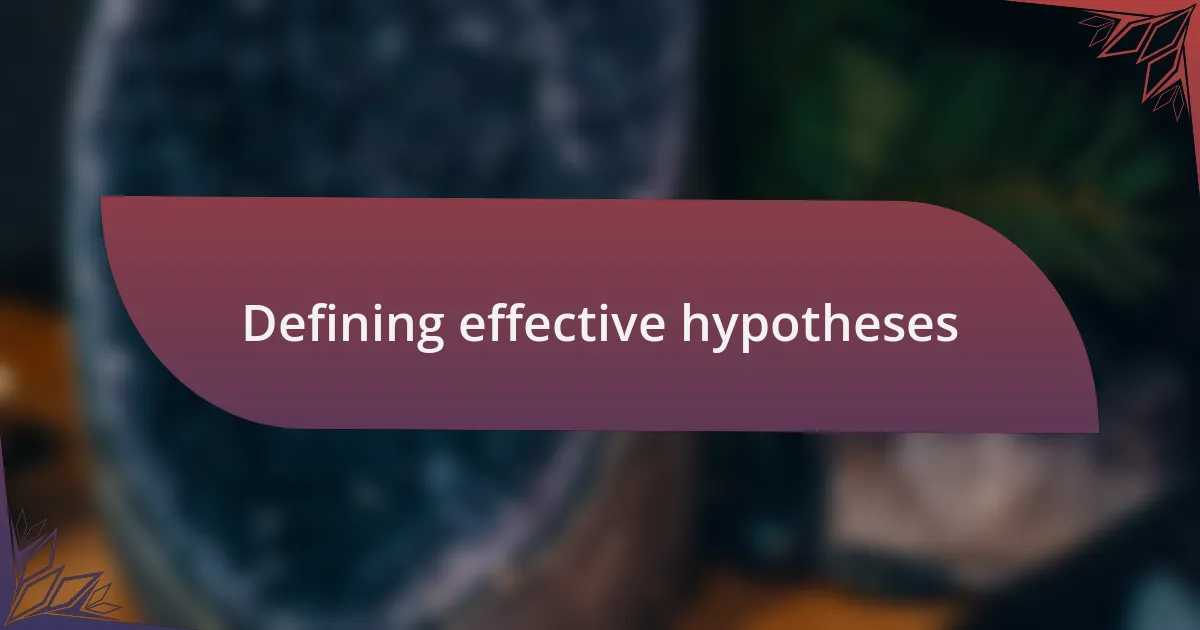
Defining effective hypotheses
Effective hypotheses are statements that can be tested and evaluated through rigorous research. They should be clear, concise, and focused, making it easier to discern whether the proposed idea holds water. I remember my first research project; crafting a hypothesis felt daunting, yet when I finally narrowed it down, everything else fell into place.
A well-defined hypothesis guides the research process, shaping the methodology and influencing the outcomes. Have you ever noticed how a vague question leads to a meandering investigation? When I refined my approach, I found that clarity not only directed my efforts but also invigorated my passion for the subject.
Moreover, a truly effective hypothesis sparks curiosity and opens avenues for further inquiry. Reflecting on my experiences, I’ve seen how a compelling hypothesis motivates not just the researcher but also engages the audience. How often do we witness debates and discussions ignited by a thought-provoking hypothesis? It’s this kind of engagement that transforms research into a dynamic conversation.
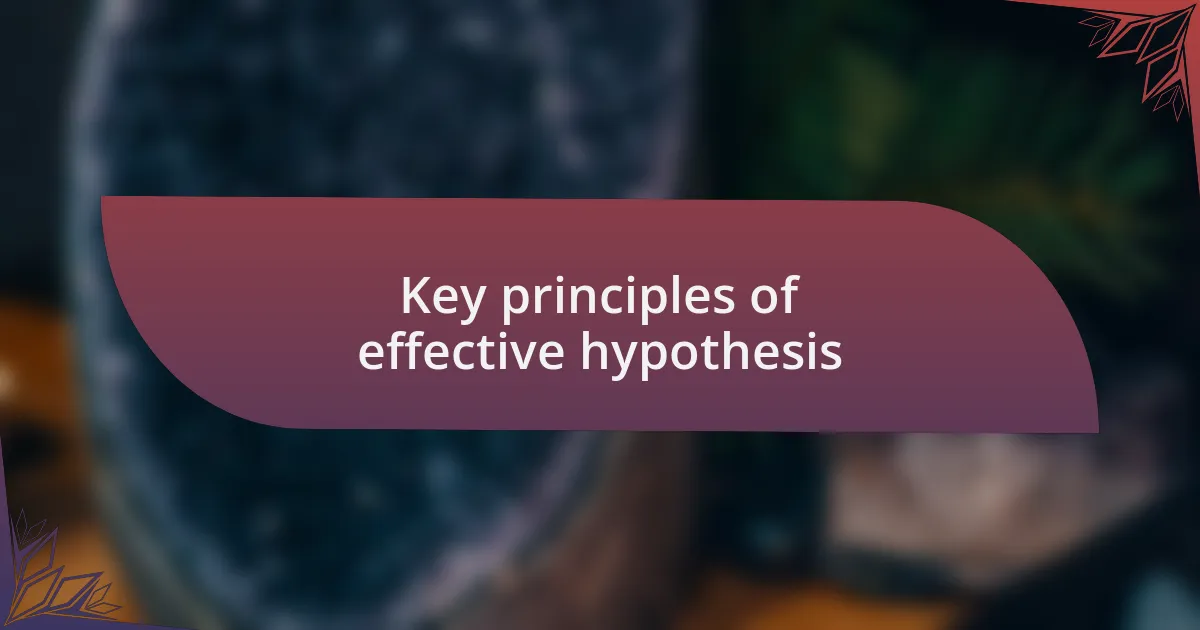
Key principles of effective hypothesis
Key principles of effective hypotheses revolve around specificity and testability. I recall one time when I was working on a public health project and initially proposed a broad hypothesis about lifestyle factors influencing health outcomes. It wasn’t until I honed in on specific behaviors, like “Does increased physical activity reduce obesity rates in teenagers?” that the project truly took form. Narrowing my focus not only clarified my research direction but also made it easier to gather the necessary data.
Another crucial principle is that a strong hypothesis should align with existing knowledge while also challenging it. On a previous project, I ventured to explore a seemingly accepted notion regarding vaccination rates. By questioning this assumption and proposing an alternative view, I opened up discussions with colleagues that ultimately enriched our understanding of the issue. Isn’t it fascinating how a hypothesis can bridge the gap between what we think we know and new insights waiting to be uncovered?
Lastly, an effective hypothesis should be framed to allow for falsifiability. I remember the excitement I felt when I crafted a hypothesis that could be easily disproven. This meant that each step of my research was an opportunity to learn something new, regardless of the outcome. After all, isn’t it through testing our ideas, whether they stand or fall, that we truly advance our understanding in public health?
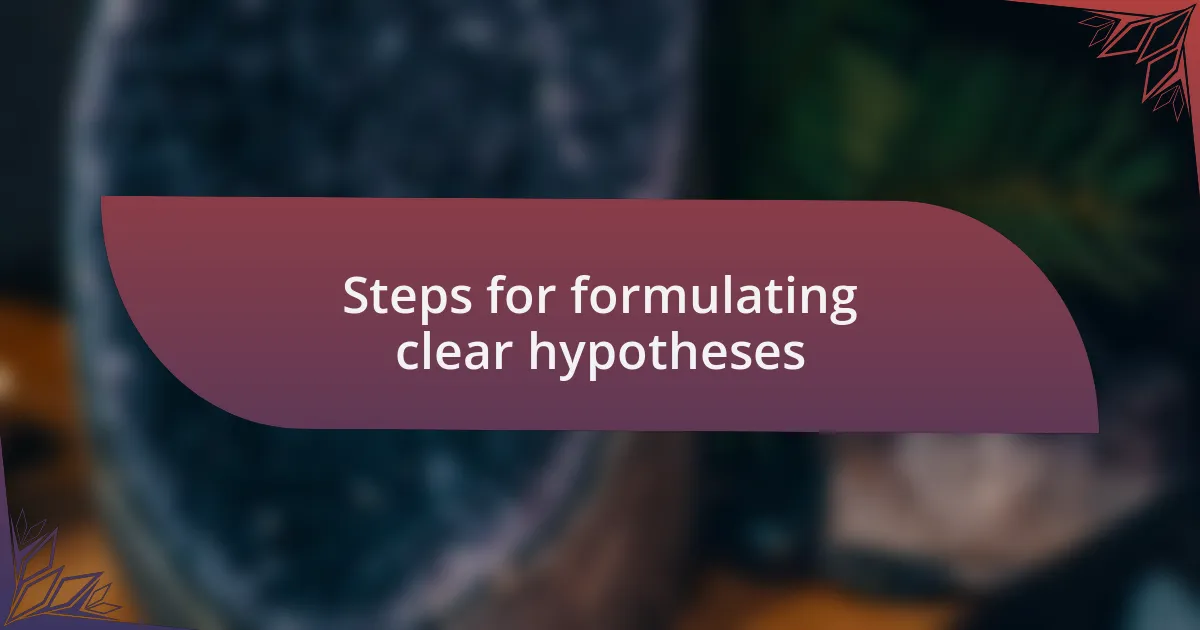
Steps for formulating clear hypotheses
Formulating a clear hypothesis begins with identifying a specific research question that piques your interest. I recall a time I started with a vague idea about healthcare access, but it wasn’t until I speculated, “How do transportation barriers affect routine check-ups among low-income families?” that my research became focused and actionable. That moment of clarity transformed my approach and set a solid foundation for the entire project.
Next, it’s essential to conduct thorough background research to ensure your hypothesis is grounded in existing literature. There was an instance during my studies when I stumbled upon unexpected data that challenged my initial assumptions about mental health services. This finding not only refined my hypothesis but also sparked a deeper investigation into underreported factors affecting access. Have you ever found that a single piece of information could pivot the direction of your thinking?
Lastly, writing your hypothesis in an if-then format can enhance its clarity and testability. When I framed my hypothesis as “If community engagement increases, then vaccination rates will rise,” it articulated a clear cause-and-effect relationship that guided my data collection. This format helped me stay focused and allowed others to understand my assertions easily. Isn’t it rewarding when a simple structure can bring so much clarity to complex ideas?
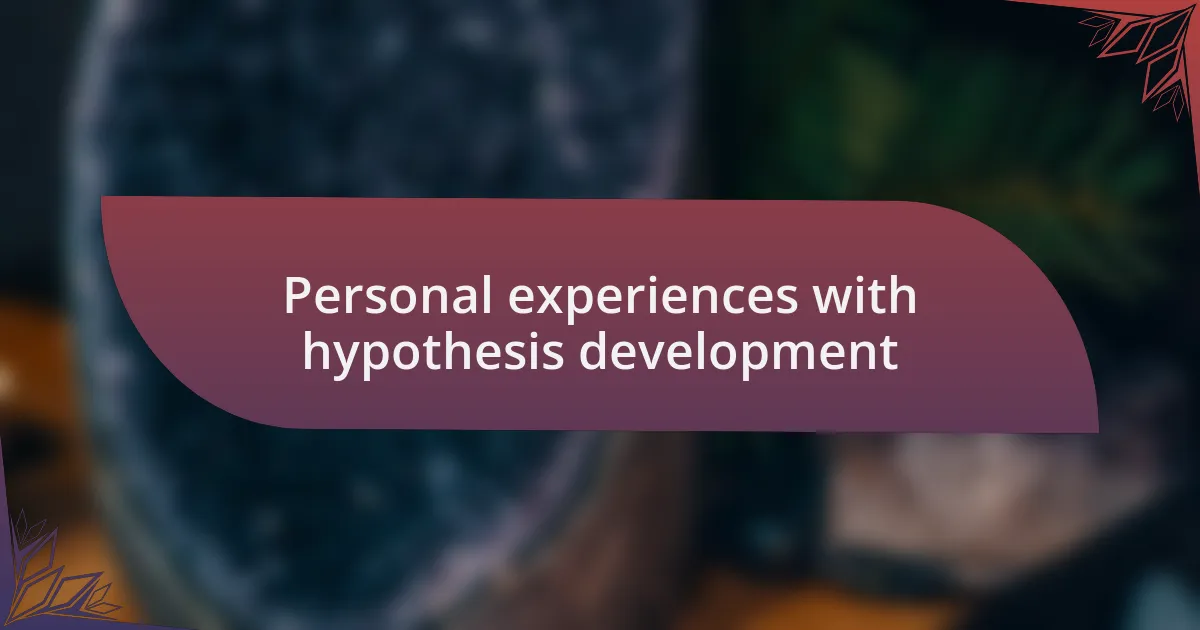
Personal experiences with hypothesis development
I vividly remember a project where my initial hypothesis was quite broad, revolving around public health disparities. It wasn’t until a mentoring session where a seasoned researcher challenged my vague notions that I re-evaluated my focus. Reflecting on that feedback sparked a deeper inquiry into the correlation between socioeconomic status and health outcomes, which transformed my study into something much more impactful.
During a research group discussion, we encountered a barrier that altered our hypothesis dramatically. We initially assumed that providing health education would suffice in improving community health. However, after hearing personal stories from community members about cultural beliefs preventing their participation, we realized our hypothesis lacked crucial context. This eye-opening experience reinforced how important it is to actively listen and incorporate diverse perspectives in hypothesis development.
One memorable experience was when I embraced the power of collaboration. I teamed up with classmates from different disciplines to develop a hypothesis on the impacts of air quality on respiratory health. The diverse insights brought to the table not only enriched our hypothesis but also created a sense of shared ownership of our findings. Have you ever experienced the thrill of co-creating something that feels greater than the sum of its parts? It’s moments like these that make hypothesis development such a gratifying journey.
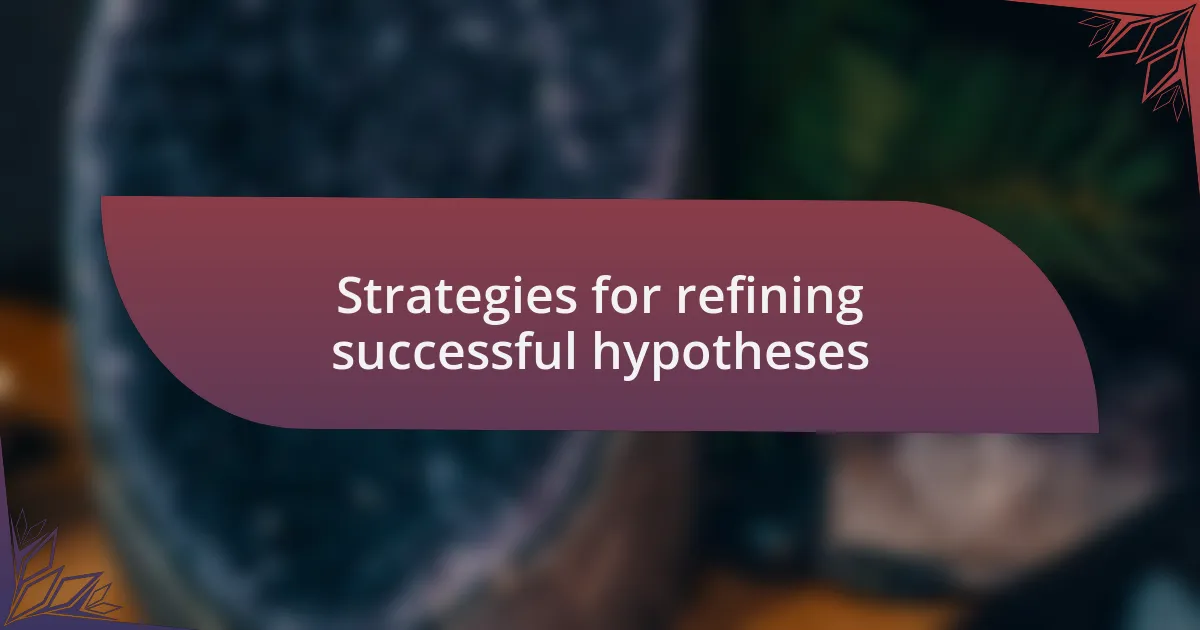
Strategies for refining successful hypotheses
It’s fascinating how refining hypotheses can often lead to unexpected discoveries. In my own experience, I learned early on to take a step back and ask pointed questions about my assumptions. For instance, while exploring the effects of diet on chronic illnesses, I created a focused hypothesis that not only considered dietary intake but also socioeconomic factors affecting access to healthy food. This exercise in specificity ultimately revealed connections I had overlooked, deepening my understanding of the issue.
Another strategy I’ve found effective is breaking down complex hypotheses into smaller, testable components. During a team project, we dissected our hypothesis about mental health interventions into manageable parts, examining each factor’s individual influence on outcomes. This approach not only clarified our research direction but also made it easier to communicate our ideas with stakeholders. Have you ever tried this method? I was amazed at how much more focused our discussions became, leading to insights that otherwise might have remained buried.
Lastly, I can’t stress enough the value of continual feedback loops in refining hypotheses. After presenting our hypothesis on access to healthcare for rural populations, we engaged with local health workers who provided invaluable insights about barriers they faced in their communities. This back-and-forth dialogue was enlightening; it demonstrated how a hypothesis isn’t a static declaration but a living entity that evolves with new information. How often do we seek out external perspectives? I find that embracing this idea can transform what we think we know into a more nuanced understanding.